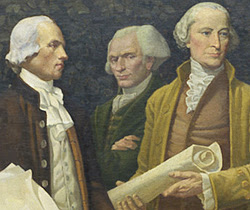Thomas Jefferson considered himself a farmer by profession. He was continually searching for more progressive ways to work his plantations at Monticello. Jefferson diligently recorded notes about the varieties of vegetables and fruits he experimented with and planted, sowing locations, harvest dates, and weather conditions. He was always interested in new seed varieties, and soil conservation was a particular passion. Jefferson was zealous about the need for farmers to share innovative ideas, improved crops, and new machinery. He invented a more efficient plow but never patented his design so that other farmers could freely benefit from the idea.
John Adams’ father was a modest but successful farmer. When John was young his parents began to worry that he was wasting his gifted intellect. His father asked him at age ten, "What would you do, child?" John answered back, "Be a farmer." The next day John's father took the boy to fields and worked him as hard as any adult. The night after young John came back tired, sore, and covered in dirt, his father asked John, "Well, John, are you satisfied with being a farmer?" His father, hoping he had taught his son a valuable lesson, was surprised by the answer. "I like it very well, Sir." Although he eventually went on to become a lawyer, John and his wife Abigail cultivated 40 acres of cropland and orchards at their own home and farm, Peacefield, near Boston.
George Washington grew wheat and corn at Mount Vernon, but struggled with the region’s thin topsoil. He undertook crop rotation and also engaged in numerous experiments to find the best form of fertilizer. He subscribed to a publication titled The Practical Farmer, which advocated the wise use of agricultural by-products and adding organic matter to improve the soil. After many trials with composting, Washington applied manure, river and creek mud, fish heads, and plaster of paris to his fields with some success. His devotion to implementing the agricultural innovations of his day was more than just the natural desire of a farmer to improve his yields. He was acutely aware of the need for the new American nation to establish itself in the world, and farming was the first occupation of the country. His commitment to agriculture was expressed in a letter from April 1788:
"Every improvement in husbandry should be gratefully received and peculiarly fostered in this Country, not only as promoting the interest and lessening the labor of the farmer, but as advancing our respectability in a national point of view; for, in the present state of America, our welfare and prosperity depend upon the cultivation of our lands and turning the produce of them to the best advantage."
Today, agriculture continues as a major industry in the United States and the country is a net exporter of food. "As of the last census of agriculture in 2007, there were 2.2 million farms in America. About 40 percent of the land in the United States is used for agriculture of some form, including livestock grazing. This includes 431.1 million acres of cropland, 396.9 million acres of pasture, and 71.5 million acres of forests. Progress in technology and crop yields has made the United States among the most productive agricultural producers in the world. The United States produces about half of the world's corn and 10 percent of its wheat. It also accounts for 20 percent of the globe's beef, pork, and lamb. With such progress in increasing output and the efficiency of agriculture, food prices for American consumers have had little increase over the past 20 years. Americans spend less on food, as a proportion of their income, than any other nation in the world."[1]
May we ever be grateful for our Founding Farmers and the rich agricultural heritage and blessings we enjoy in this bounteous land.
_______________________
[1] Read more: United States of America Agriculture, Information about Agriculture in United States of America
[1] Read more: United States of America Agriculture, Information about Agriculture in United States of America
See also: Andrea Wulf, Founding Gardners: The Revolutionary Generation, Nature, and the Shaping of a Nation (Vintage, 2012).
https://www.amazon.com/Founding-Gardeners-Revolutionary-Generation-American/dp/0307390683/



